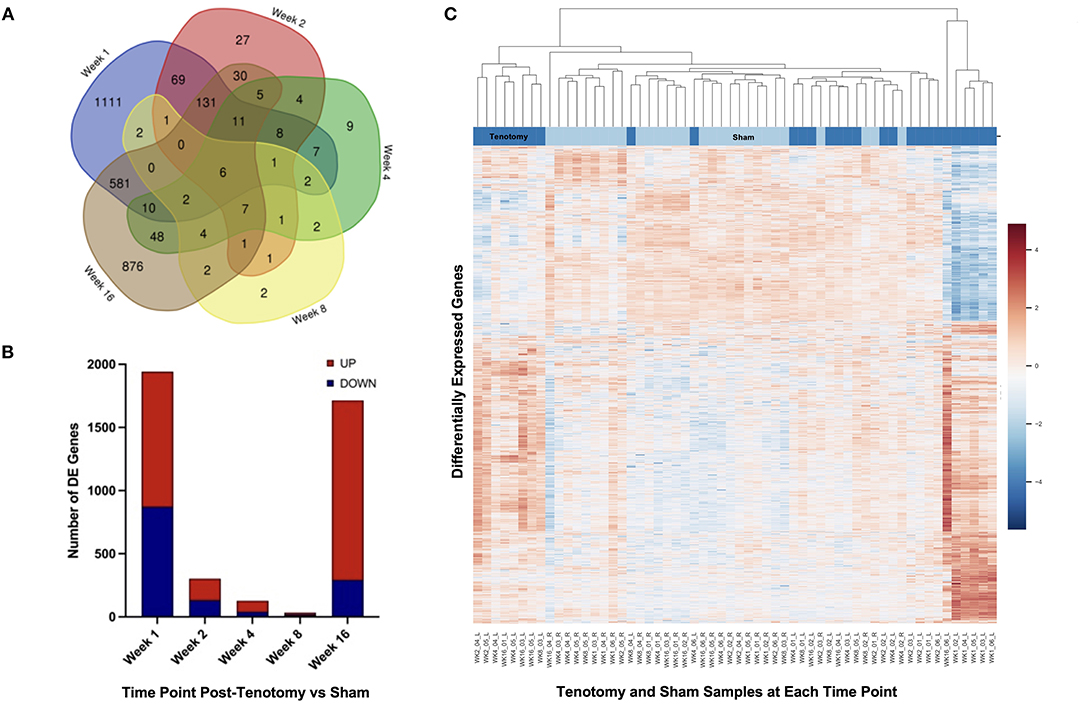- 1Department of Bioengineering, University of California, San Diego, San Diego, CA, United States
- 2Department of Orthopaedic Surgery, University of California, San Diego, San Diego, CA, United States
- 3Department of Orthopedic Surgery, Kaiser Permanente, San Diego, CA, United States
- 4Center for Computational Biology and Bioinformatics, Department of Medicine, University of California, San Diego, San Diego, CA, United States
- 5Department of Radiology, University of California, San Diego, San Diego, CA, United States
A Corrigendum on
Transcriptional Time Course After Rotator Cuff Tear
by Vasquez-Bolanos, L. S., Gibbons, M. C., Ruoss, S., Wu, I. T., Vargas-Vila, M., Hyman, S. A., Esparza, M. C., Fithian, D. C., Lane, J. G., Singh, A., Nasamran, C. A., Fisch, K. M., and Ward, S. R. (2021). Front. Physiol. 12:707116. doi: 10.3389/fphys.2021.707116
In the original article, there was a mistake in Figure 3 as published. An older version of the figure was published by mistake. The corrected Figure 3 appears below.

Figure 3. Distribution of samples by tenotomy vs sham and DE genes over each time point post-tenotomy. Venn diagram (A) highlights the DE genes at each time point and the overlap with other time points. The bar chart (B) displays the number of DE genes which are up or down regulated at each timepoint. Data in the heatmap (C) is presented as normalized expression for each tenotomy and sham sample at each time point post-tenotomy with a z-score scale by rows and an average hierarchical clustering by columns.
The authors apologize for this error and state that this does not change the scientific conclusions of the article in any way. The original article has been updated.
Publisher's Note
All claims expressed in this article are solely those of the authors and do not necessarily represent those of their affiliated organizations, or those of the publisher, the editors and the reviewers. Any product that may be evaluated in this article, or claim that may be made by its manufacturer, is not guaranteed or endorsed by the publisher.
Keywords: rotator cuff, rotator cuff muscle dysfunction, transcriptome (RNA-seq), time series data analysis, muscle biology, tenotomy, muscle atrophy
Citation: Vasquez-Bolanos LS, Gibbons MC, Ruoss S, Wu IT, Vargas-Vila M, Hyman SA, Esparza MC, Fithian DC, Lane JG, Singh A, Nasamran CA, Fisch KM and Ward SR (2021) Corrigendum: Transcriptional Time Course After Rotator Cuff Tear. Front. Physiol. 12:775297. doi: 10.3389/fphys.2021.775297
Received: 13 September 2021; Accepted: 07 October 2021;
Published: 29 October 2021.
Edited and reviewed by: Anselmo Sigari Moriscot, University of São Paulo, Brazil
Copyright © 2021 Vasquez-Bolanos, Gibbons, Ruoss, Wu, Vargas-Vila, Hyman, Esparza, Fithian, Lane, Singh, Nasamran, Fisch and Ward. This is an open-access article distributed under the terms of the Creative Commons Attribution License (CC BY). The use, distribution or reproduction in other forums is permitted, provided the original author(s) and the copyright owner(s) are credited and that the original publication in this journal is cited, in accordance with accepted academic practice. No use, distribution or reproduction is permitted which does not comply with these terms.
*Correspondence: Samuel R. Ward, czF3YXJkQHVjc2QuZWR1
 Laura S. Vasquez-Bolanos
Laura S. Vasquez-Bolanos Michael C. Gibbons1,2
Michael C. Gibbons1,2 Severin Ruoss
Severin Ruoss Chanond A. Nasamran
Chanond A. Nasamran Kathleen M. Fisch
Kathleen M. Fisch Samuel R. Ward
Samuel R. Ward